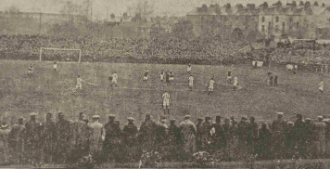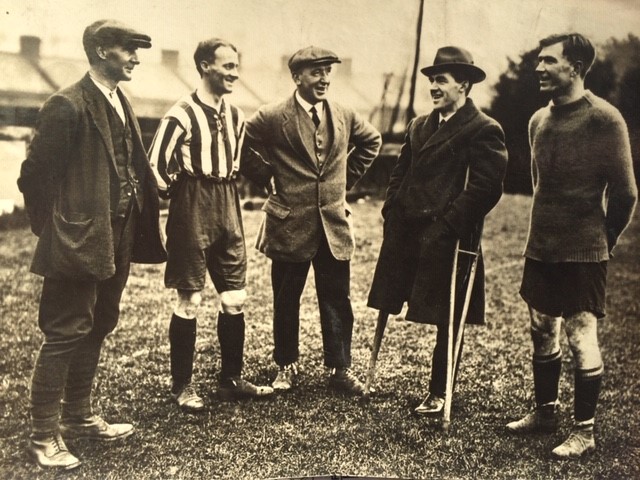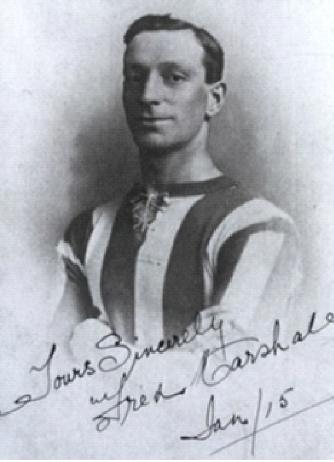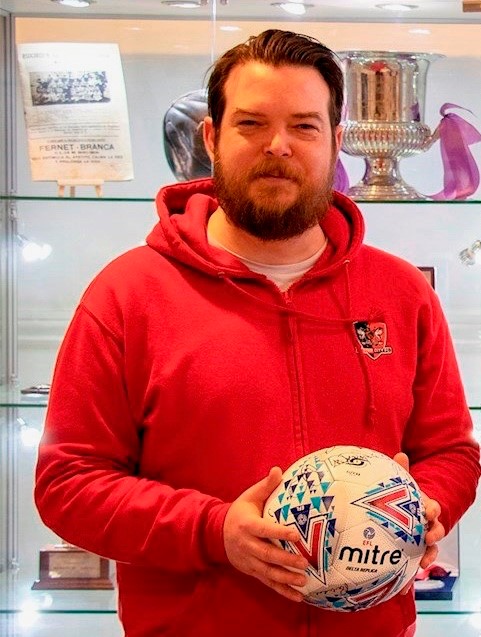Exeter City FC Remembers: The 1914 FA Cup
09/11/2020 - 1.00
Will Barrett
As the footballing community remembers all those who have died as a result of war, I take a look back at Exeter City’s final FA Cup run before the outbreak of the First World War and the impact of that conflict.
Whilst the 1914 FA Cup campaign was not particularly long, it was certainly a memorable, impactful and poignant one as games against Portsmouth and Aston Villa brought great pride and cheer to a club that had its fair share of struggles in its early years as a professional club.
Having turned professional in 1908, City had struggled to find their feet and it was not till our 7th placed finish in the 1912/13 season that the club had managed to end a campaign with a positive goal difference.
However, the team was beginning to take shape, with players such as Dick Pym, Fred Whittaker and Jimmy Rigby increasing their influence on the side as we headed to Fratton Park on the 10th of January 1914.
Against the expectations of the crowd, City defied the odds in dramatic fashion as a penalty save from Pym and goals from Harry Holt and Fred Marshall saw the Grecians run out 4-0 winners against the South Coast giants.
On returning home, as the story goes, a crowd were awaiting the players at the Queen Street train station, and amidst huge cheers Holt and Marshall were carried on people’s shoulders as a rare case of football fever swept across the city.
In the following round the club welcomed Aston Villa, the then holders of the FA Cup, to St James Park. Given the status and reputation of the visiting team, the match attracted levels of interest never seen before in Exeter, and reports revealed that ‘tramcars and every conceivable form of transport converged on the ground’, while the gates had to be closed early to avoid problems.

Image from the Grecian Archive of City v Aston Villa in the 1914 FA Cup
The official attendance for the game was given as 10,000, which surprised the supporters who thought that there were at least 13,000 packed in the ground, with even more hanging out of nearby windows to get a glimpse of the action.
From the kick-off the ground was on the slippery side, and a drizzle was falling. City opened shakily, and after five minutes of bright play Hampton had put the visitor’s in front with a fine header.
However, this seemed to wake up the Grecians and with ten minutes graft of their own they earned a penalty, only to see Fort hit the upright with a powerful shot from the spot.
The second half opening was full of bright and fast football, but it was Villa who doubled their lead when Hampton latched onto a long ball from Lyons and tucked the ball past Pym in the Exeter Goal.
Again, Exeter responded with tireless running and good use of the ball, and just after the hour mark McCann pulled one back for City. From here on the home side gave their illustrious opponent’s a game that no one expected of them, and at the final whistle all agreed that Villa were fortunate to be going through to the next round.
Whilst the cup run was brief, it certainly led to a much longer adventure as City’s displays brought them into view just as the authorities were looking for a professional team to tour Argentina in the summer months.
The rest, as they say, is history. The club’s trip to South America resulted in the Grecians becoming the first opponents for the Brazilian national side but as the team made their way back across the Atlantic Ocean, they returned to find a continent that was changing rapidly due to the outbreak of the First World War.
The cheers and adventures of previous months eventually gave way to the war effort as both players and fans alike signed up to the cause, and by 1915 St James Park had dual purpose as both a sporting and military venue.
Of those players who played for City in the FA Cup run and the subsequent games in Argentina and Brazil, remarkably all survived the war. However, more than a dozen footballers with City connections were killed in action, whilst Billy Smith and cup hero Fred Marshall never played again due to their injuries.

Billy Smith (pictured 2nd right) on his return to St James Park
Sadly, it is also not beyond the realm of imagination that many of those who packed the streets and the terraces during the memorable cup run were also deeply impacted by the war, and while the club returned to play at the Park in February 1919, there were those who were not here to witness the people that they had previously seen as the heroes, return to action on a more forgiving field.
The tale of City’s cup run and the events that followed is a timely reminder of the beauty of football and the impact of war. It is also a story that we can perhaps relate to a fraction more this year, as we face our own challenges as a community and await the day when we can return home to acknowledge those who have given so much and to follow the boys in red & white.
Our St James Park is now unrecognisable to the one that stood here on that drizzly February afternoon in 1914, but today, as always, we will remember all those players and fans, who graced the pitch and cheered from those stands, and fought and died more than a century ago.

Fred Marshall
Forever Grecians.
Biography
Dr Will Barrett has worked for the last seven years alongside colleagues from the University of Exeter and Exeter City Football Club to create and develop the Grecian Archive and ECFC Museum Trust. As the co-ordinator for three National Lottery Heritage Funded projects at St James Park he has been involved in delivering a range of exhibits and displays – both online and through a stadium-wide approach to curation – and the creation of a bespoke framework for the collection, preservation, sharing and celebration of tangible and intangible heritage. Will is a keen advocate of co-curation and community driven heritage initiatives and works to promote the value of sporting and cultural heritage beyond the sphere of traditional institutions. Will is also a trustee of the Exeter City Football Club Supporters’ Trust, who are the majority shareholders of the League Two club.



/prod01/wlvacuk/media/departments/media-and-communications/images-18-19/220325-Engineers_teach_thumbail.jpg)
/prod01/wlvacuk/media/departments/media-and-communications/images-18-19/BBR_logo_large.jpg)
/prod01/wlvacuk/media/departments/media-and-communications/images-18-19/Wolves-Story-Thumb.jpg)
/prod01/wlvacuk/media/departments/media-and-communications/images-18-19/220505-BAS9-School-Showcase-Resized.jpg)
/prod01/wlvacuk/media/departments/business-solutions/images/banners/business-we-back-you-500x250.jpg)